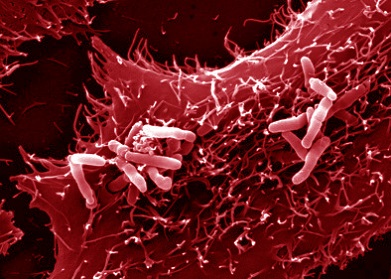Scientists discover that a rare bacteria can cause lung disease in immunocompromised patients such as those with HIV
Nikhil Prasad Fact checked by:Thailand Medical News Team Nov 30, 2024 1 year, 3 weeks, 4 hours, 6 minutes ago
Medical News: Rhodococcus equi, a bacteria historically associated with infections in animals, is now recognized as a rare but significant cause of lung infections in immunocompromised individuals. This opportunistic pathogen thrives in people with weakened immune systems, such as those with advanced HIV/AIDS, often causing severe cavitating pneumonia. This
Medical News report delves into the findings of a recent case series from the University Hospital of Antwerp, Belgium, where researchers explored three cases of this uncommon bacterial infection in HIV-positive patients.
 Scientists discover that a rare bacteria can cause lung disease in
Scientists discover that a rare bacteria can cause lung disease in
immunocompromised patients such as those with HIV
Insights into the Study
The team of researchers, including specialists from the University Hospital Antwerp’s Departments of General Internal Medicine, Infectious Diseases, and Tropical Medicine, and the Institute of Tropical Medicine, examined three HIV-positive patients who developed Rhodococcus equi infections. Each of the patients presented with severe symptoms of lung disease, and their histories highlighted the challenges of diagnosing and treating such cases.
The case study findings emphasize the clinical presentations, treatment regimens, and outcomes of these cases. The insights provide valuable guidance for healthcare providers encountering similar infections.
The Bacteria and Its Impact
Rhodococcus equi is a gram-positive coccobacillus, primarily found in the intestines and feces of herbivores. While it typically infects animals like foals, humans can contract it through inhalation of contaminated dust or aerosols, especially in environments with livestock. In immunocompromised individuals, such as those with HIV/AIDS or undergoing cancer treatment, the bacteria can cause necrotizing pneumonia with severe cavitation in the lungs.
The pathogen's ability to replicate inside macrophages - the immune system's defense cells - makes it particularly hard to treat. Left untreated, the infection can spread, potentially leading to brain abscesses, lymph node infections, and other complications.
Case Highlights
Case 1: A 37-year-old man with HIV presented with hemoptysis (coughing blood) and poor health. His CD4 count was alarmingly low at 13 cells/mm³, indicating advanced immunosuppression. A CT scan revealed a large cavitating lesion in the upper right lung. Although initial tests ruled out tuberculosis, cultures confirmed Rhodococcus equi. After a complicated treatment course involving antibiotics and antiretroviral adjustments, the patient achieved full recovery over six months.
Case 2: A 46-year-old woman with a history of poor adherence to antiretroviral therapy exhibited symptoms of fever, productive cough, and shortness of breath. Living on a farm with goats likely contributed to her exposure. Laboratory tests identified both Rhodococ
cus equi and Pneumocystis jirovecii in her lung samples. Despite initial treatment efforts, she was lost to follow-up after hospitalization, leaving her long-term outcome unclear.
Case 3: A 45-year-old harbor worker exposed to horse hides developed necrotizing pneumonia shortly after starting antiretroviral therapy. His condition improved significantly with a combination of azithromycin and rifampicin, along with changes to his HIV medications. After several months, he fully recovered and resumed work.
Challenges in Diagnosis and Treatment
Diagnosing Rhodococcus equi infections is complex due to the bacteria’s similarity to other pathogens, such as Mycobacterium tuberculosis. Standard gram staining can be misleading, as the organism may resemble normal respiratory flora. Advanced diagnostic tools like molecular testing and culture identification are crucial for accurate detection.
Treatment requires a combination of antibiotics with intracellular activity, such as macrolides or rifamycins, often paired with bactericidal agents like carbapenems. Drug susceptibility testing is essential but not universally available, complicating the selection of effective therapies. Moreover, interactions between antibiotics and antiretroviral drugs pose additional challenges.
Key Findings from the Study
-Pulmonary Focus: In immunocompromised patients, Rhodococcus equi primarily affects the lungs, presenting as cavitating pneumonia. Upper lung lobes are the most common sites of infection.
-Immune Restoration is Critical: Effective treatment includes not only antibiotics but also the restoration of the patient’s immune system through antiretroviral therapy.
-Exposure Risks: Two out of three patients had known contact with livestock or animal products, underscoring the role of environmental exposure in transmission.
-Antibiotic Resistance: Resistance is an emerging concern, emphasizing the need for tailored treatment plans based on susceptibility testing.
Broader Implications
Although rare, Rhodococcus equi infections are rising, partly due to better diagnostic tools and a growing population of immunocompromised individuals. This increase highlights the importance of awareness among healthcare providers and the need for further research to optimize treatment protocols.
Conclusion
Rhodococcus equi represents a challenging pathogen that disproportionately affects vulnerable populations. This study underscores the need for prompt recognition, accurate diagnosis, and comprehensive treatment strategies to combat the infection effectively. Improved collaboration between clinicians and microbiologists is essential to manage these cases successfully. Future research should focus on developing standardized treatment guidelines and exploring preventive measures for at-risk groups.
The study findings were published in the peer-reviewed journal: Case Reports in Infectious Diseases.
https://onlinelibrary.wiley.com/doi/10.1155/2024/5570186
For the latest on Rhodococcus equi., keep on logging to Thailand
Medical News.
Read Also:
https://www.thailandmedical.news/news/necrotizing-pneumonia-a-deadly-lung-infection
https://www.thailandmedical.news/news/covid-19-is-not-mild-as-most-will-develop-lung-fibrosis-10-percent-of-all-lung-transplants-in-u-s-now-go-to-post-covid-patients
